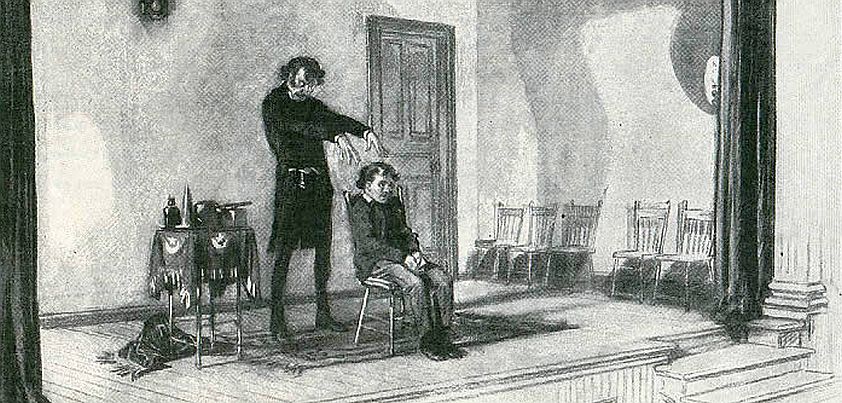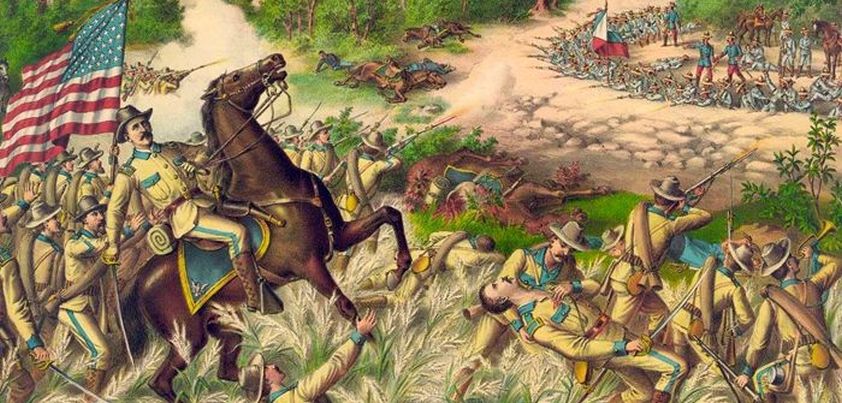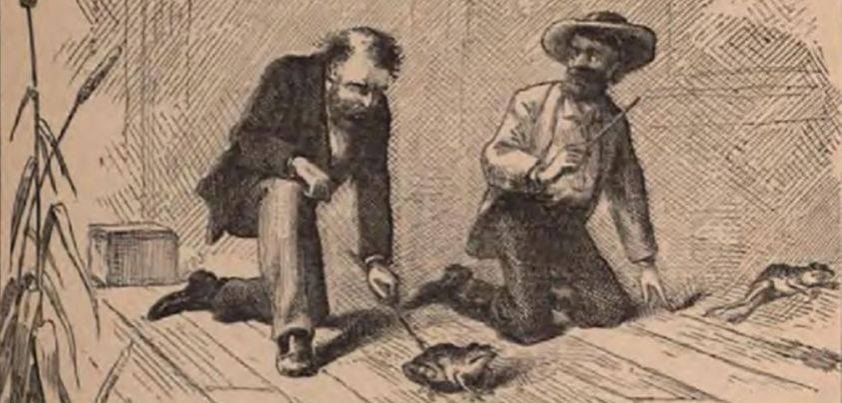 In this story taken from the Autobiography of Mark Twain, the author reminisces about a childhood prank that still haunts him in adult life. When a traveling mesmerizer (hypnotist) came to town, young Twain volunteered as a subject to show off before the public … and make the people laugh and shout and admire. His performance was so convincing that he fooled everyone in town. Later in life he comes to regret the deception, but learns that it can sometimes prove very difficult to undo a lie. Themes include showmanship, deception, the temporary nature of fame, cruelty, gullibility. More…
In this story taken from the Autobiography of Mark Twain, the author reminisces about a childhood prank that still haunts him in adult life. When a traveling mesmerizer (hypnotist) came to town, young Twain volunteered as a subject to show off before the public … and make the people laugh and shout and admire. His performance was so convincing that he fooled everyone in town. Later in life he comes to regret the deception, but learns that it can sometimes prove very difficult to undo a lie. Themes include showmanship, deception, the temporary nature of fame, cruelty, gullibility. More…
Archives
The War Prayer
 Following Russia’s recent invasion of Ukraine, it seems appropriate to feature one of literature’s most famous “anti-war” stories. Written in 1905, this narrative essay by Samuel Clemens (aka Mark Twain) is a condemnation of the American imperialist agenda that led to the Spanish and Filipino-American Wars. With his usual sarcasm and wit, Twain brushes aside patriotic bravado and poignantly focuses on the suffering of combatants and civilians on both sides. Themes: patriotism, the horrors of war, the connection between the church (religion) and war, the selfish one-sidedness of war prayers vs. the universality of God. More…
Following Russia’s recent invasion of Ukraine, it seems appropriate to feature one of literature’s most famous “anti-war” stories. Written in 1905, this narrative essay by Samuel Clemens (aka Mark Twain) is a condemnation of the American imperialist agenda that led to the Spanish and Filipino-American Wars. With his usual sarcasm and wit, Twain brushes aside patriotic bravado and poignantly focuses on the suffering of combatants and civilians on both sides. Themes: patriotism, the horrors of war, the connection between the church (religion) and war, the selfish one-sidedness of war prayers vs. the universality of God. More…
The Million Pound Bank Note
 This humorous story from Samuel Clemens (aka Mark Twain) explores two themes related to the power of money. The first is the different attitudes people have towards the rich and the poor. The second, which is particularly relevant today, is the power the rich (influencers) can exert over the decision-making of admirers (followers). Other themes: enduring love (Portia and Henry’s relationship prospers, despite their playful deceptions); honesty (Henry’s intention to pay back his debts); and the peculiarities of British High Society (settling arguments with bets, determining social position through gossip columns, and missing meals if unable to decide seating precedence). More…
This humorous story from Samuel Clemens (aka Mark Twain) explores two themes related to the power of money. The first is the different attitudes people have towards the rich and the poor. The second, which is particularly relevant today, is the power the rich (influencers) can exert over the decision-making of admirers (followers). Other themes: enduring love (Portia and Henry’s relationship prospers, despite their playful deceptions); honesty (Henry’s intention to pay back his debts); and the peculiarities of British High Society (settling arguments with bets, determining social position through gossip columns, and missing meals if unable to decide seating precedence). More…
The Californian’s Tale
 The major themes of this story from Samuel Clemens (aka Mark Twain) are loneliness, love, loss, madness and friendship. A prospector wandering the desolate Californian goldfields after the mines had all closed is surprised to come across a beautifully maintained cabin. When asked inside by the owner, he marvels at the comfort and quality of its furnishings and obvious signs of a woman’s touch. The man tells him that his wife is away visiting family but will return in three days. The prospector accepts the man’s invitation to stay and meet her, but later wishes he hadn’t. More…
The major themes of this story from Samuel Clemens (aka Mark Twain) are loneliness, love, loss, madness and friendship. A prospector wandering the desolate Californian goldfields after the mines had all closed is surprised to come across a beautifully maintained cabin. When asked inside by the owner, he marvels at the comfort and quality of its furnishings and obvious signs of a woman’s touch. The man tells him that his wife is away visiting family but will return in three days. The prospector accepts the man’s invitation to stay and meet her, but later wishes he hadn’t. More…
The Celebrated Jumping Frog
 The humorous frame story of this unlikely tale by Samuel Clemens (aka Mark Twain) satirizes the way late nineteenth-century American “Easterners” looked down on their supposedly less sophisticated Western compatriots. In the inner story, a man named Jim loves gambling so much that he will bet on almost anything. He finds a frog he believes can leap further than any other in Calaveras County, and learns an expensive lesson when a passing stranger bets against his frog and wins easily. Themes include regional stereotypes, storytelling (tall-tales), gambling consequences (there’s no such thing as a sure bet), trickery and deception. More…
The humorous frame story of this unlikely tale by Samuel Clemens (aka Mark Twain) satirizes the way late nineteenth-century American “Easterners” looked down on their supposedly less sophisticated Western compatriots. In the inner story, a man named Jim loves gambling so much that he will bet on almost anything. He finds a frog he believes can leap further than any other in Calaveras County, and learns an expensive lesson when a passing stranger bets against his frog and wins easily. Themes include regional stereotypes, storytelling (tall-tales), gambling consequences (there’s no such thing as a sure bet), trickery and deception. More…
Luck
 As the name implies, the major theme of Luck by Samuel Clemens (aka Mark Twain) is just that — Luck! Its main message is that good fortune can result in the most unlikely people achieving greatness. Other themes include envy and injustice. The clergyman envies Lieutenant General Lord Arthur Scoresby, V.C., K.C.B., etc. for his successes in life… especially on the battlefield where, in reality, he didn’t seem to know back from forwards and right from left. There is also a sense of injustice in that the General appears to show no appreciation for the clergyman’s role in his success. More…
As the name implies, the major theme of Luck by Samuel Clemens (aka Mark Twain) is just that — Luck! Its main message is that good fortune can result in the most unlikely people achieving greatness. Other themes include envy and injustice. The clergyman envies Lieutenant General Lord Arthur Scoresby, V.C., K.C.B., etc. for his successes in life… especially on the battlefield where, in reality, he didn’t seem to know back from forwards and right from left. There is also a sense of injustice in that the General appears to show no appreciation for the clergyman’s role in his success. More…
The Man That Corrupted Hadleyburg
 Samuel Clemens (aka Mark Twain)’s imaginary Hadleyburg is a remarkable place. Despite its reputation for being the most honest and upright town in all the region, its citizens managed to offend a vindictive passing stranger. The visitor was so upset that he came up with an elaborate plan to destroy the town’s image. Ironically, as the story plays out, we learn that Hadleyburg’s version of “honesty” came at a price. It is a mean, hard, stingy town, and hasn’t a virtue in the world. Themes: revenge, appearance vs. reality, hypocrisy, temptation, morality vs. greed, “herd mentality”, guilt and shame. More…
Samuel Clemens (aka Mark Twain)’s imaginary Hadleyburg is a remarkable place. Despite its reputation for being the most honest and upright town in all the region, its citizens managed to offend a vindictive passing stranger. The visitor was so upset that he came up with an elaborate plan to destroy the town’s image. Ironically, as the story plays out, we learn that Hadleyburg’s version of “honesty” came at a price. It is a mean, hard, stingy town, and hasn’t a virtue in the world. Themes: revenge, appearance vs. reality, hypocrisy, temptation, morality vs. greed, “herd mentality”, guilt and shame. More…
Stories of the Bad & Good Little Boys
 We are presenting these stories from Samuel Clemens (aka Mark Twain) together because, although the characters appear to be opposites, they actually support the same themes: 1) all people have a bad and/or selfish side; and 2) whether good or bad, people don’t always get the reward/punishment they deserve. While the bad boy appears inherently evil, the “good” boy’s motivation is his selfish wish for eternal praise. With its over-the-top sarcasm, the story of the bad little boy has an even more depressing message… bad boys grow into bad men, and the worst of them end up becoming successful politicians! More…
We are presenting these stories from Samuel Clemens (aka Mark Twain) together because, although the characters appear to be opposites, they actually support the same themes: 1) all people have a bad and/or selfish side; and 2) whether good or bad, people don’t always get the reward/punishment they deserve. While the bad boy appears inherently evil, the “good” boy’s motivation is his selfish wish for eternal praise. With its over-the-top sarcasm, the story of the bad little boy has an even more depressing message… bad boys grow into bad men, and the worst of them end up becoming successful politicians! More…